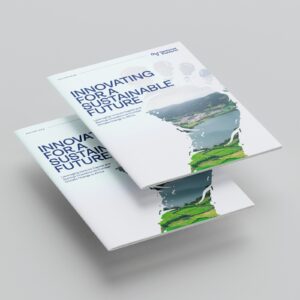Ventures Platform, an early-stage venture capital fund investing in innovative startups across Africa, has published its landmark climate tech whitepaper entitled, “Innovating for a Sustainable Future: Leveraging venture capital and startup Innovation to combat climate change in Africa.”
Formally launched at the recently held Africa Prosperity Summit in Lagos, the paper explores how the agility and innovation of startups, combined with the strategic deployment of venture capital, can catalyse the development and scaling of climate-smart solutions tailored to the specific needs and challenges of African communities and ecosystems. Furthermore, the paper offers insights to climate tech startups on how to secure and maintain venture capital support, while providing an in-depth analysis of how venture capital and startup ecosystems can act as powerful engines of progress in the face of environmental adversity.
Since launching in 2016, Ventures Platform has funded over 90 startups, with at least one in every region of the continent and across various sectors including climate tech. Many of its startups are category leaders in fintech, healthtech, and insurtech, including Moniepoint, Mdaas Global and Tanel Health. While not primarily a climate fund, Ventures Platform recognises the importance of sustainable investments for long-term prosperity and has factored this into its investment guidelines by prioritising businesses that implement sustainable practices, reduce environmental impact and drive long-term ecological benefits. Drawing from its learnings as a key player in Africa’s tech ecosystem and from broader research, Ventures Platform has published this climatetech white paper to better equip non-climate Venture Capitalists (VCs) and startups with insights and tools to support Africa’s climate resilience through strategic investments and operational choices.
According to the United Nations, Africa contributes under 4% of the global greenhouse gas emissions yet suffers disproportionately from climate change. In this white paper, Ventures Platform proposes a simplified framework focusing on adaptation, mitigation and enablers, to guide the African VC and startup ecosystem in addressing climate challenges. Adaptation strategies include developing climate-resilient infrastructure and agricultural practices. Mitigation efforts focus on reducing greenhouse gas emissions through renewable energy adoption and sustainable land use while ‘enablers’ encompass financing mechanisms, policy frameworks, educational programs, and technological innovations.

He continued, “Climate change poses formidable threats with potential for severe impacts across multiple sectors; however, building climate-resilient business models can unlock business, societal and environmental sustainability. As Venture Capitalists, we can drive change in Africa’s climate action by providing funds, encouraging innovation, and scaling climate-smart solutions. Startups like MAX, Rana Energy, and ThriveAgric, which was recognised in the 2024 TIME 100 Climate list, show how tech-driven solutions can address local issues and help global climate efforts. At Ventures Platform, we are deeply committed to investing in companies that are not only commercially successful but also actively contribute to solving some of society’s collective challenges”.
Commenting further on the landmark paper, Dolapo Morgan, Senior Investment Associate, Ventures Platform, shared, “Africa is at the receiving end of the world’s climate disaster and it is important for us to turn this challenge into opportunities. It is time for entrepreneurs to focus on building climate-resilient business models for long term sustainability while creating innovative climate solutions to tackle climate challenges. We are already beginning to see some startups and investors move in this direction and that is a good start. This white paper is a call for a coordinated Africa response towards scaling the opportunities that climate change presents to our technology sector, emphasizing the pivotal role non-climate funds can play in complementing and amplifying the efforts of climate-focused investments.
For climate tech startups in Africa to secure and maintain venture capital support, it is crucial to demonstrate both the potential for significant climate impact as well as the ability to achieve venture scale economics. This dual focus is essential in the context of addressing climate change while also delivering the rapid growth and high returns that VCs expect. To optimise this key positioning, Ventures Platform via this white paper, outlines key goals, strategies, challenges, and ecosystem support needed to enhance the impact of African climate tech startups, providing a comprehensive guide for non-climate VCs and entrepreneurs in the technology sector. It also proposes a framework for a coordinated climate response in the African tech sector.
Some key recommendations offered include:
The need to establish an inclusive climate innovation fund to support underrepresented groups in climate entrepreneurship.
Development of Africa-specific metrics for measuring the success and impact of climate-focused startups, considering both environmental and socio-economic factors.
The facilitation of cross-border collaborations between different types of VCs through networking events, joint investment programs, and knowledge-sharing platforms.
Conduction of sector-specific climate opportunity assessments to identify and prioritise high-potential sectors for climate innovation in Africa.
Venture Platform’s Innovating For a Sustainable Future climatetech white paper can be accessed in full here.
About Ventures Platform
Ventures Platform is an early-stage VC fund that invests in innovative startups across Africa. It targets companies that bridge infrastructural gaps and promote prosperity by eliminating access barriers and reducing delivery costs across the continent by identifying companies that address non-consumption through market-creating innovations. Ventures Platform is currently investing out of a $50 million fund, with limited partners including UAC, AfricaGrow, Standard Bank Group, Proparco, IFC, and BII. Portfolio companies include Omnibiz, Sunfi, Paystack, SunFi, Fez Delivery, ThriveAgric, PiggyVest.
Source: Dennis Ato Keelson
